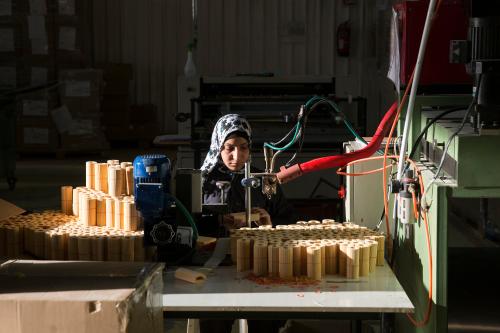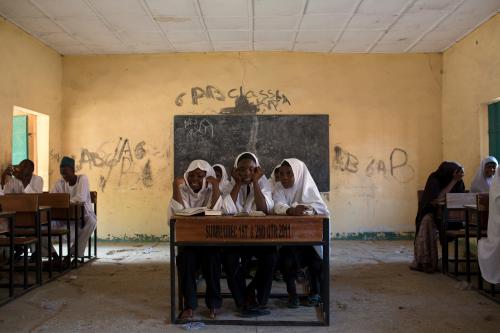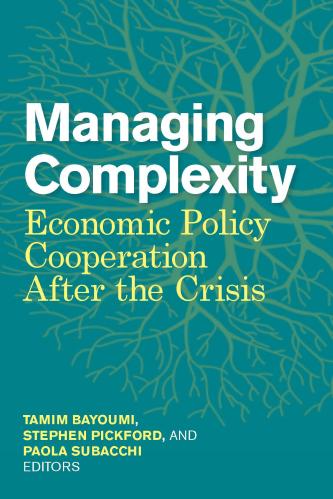Editor’s Note: This blog is the first of three that will profile local leaders from around the world who advocate for improved education—especially for girls—in their communities. These blogs will culminate in a Brookings event on December 12 featuring two panels on the issues and a keynote address by First Lady of the United States Michelle Obama. Register for the webcast here and follow along on Twitter at #GirlsEdu.
In 2010, a garment factory in one of Jordan’s Qualified Industrial Zones was recruiting from one of the poorest neighborhoods in the country’s capital, Amman. The company was working in partnership with a community-based women’s charity organization (CBO) to secure a qualified workforce for the factory. The demand-driven employment program that was spearheaded by the organization Jordan Education for Employment (JEFE), which I was then directing, secured jobs in the factory for youth from this underprivileged community on the condition that they participate in an intensive skills training program. At the time, the entire model seemed like a win-win situation for both the youth and the private sector. Yet data showed that almost 63 percent of the females trained in the program declined the jobs that were offered to them. Feedback from focus groups later revealed that the women were forced by their families not to accept the jobs in the factories because their mixed work environment with foreign laborers posed a threat to their values and ideologies.
Shortly after this failed attempt at empowering women with employment opportunities, I attended a series of sessions that had been arranged to engage the community and the private sector in an open dialogue to understand the deeper issues underlying the low workforce participation of women. The private sector was willing to pay health insurance, social security and provide transportation to and from work for these women. However, because these efforts were being implemented by JEFE and the charity organization without full buy-in from the entire community, these female-friendly economic practices ultimately fell short of achieving their goals. Moreover, these initiatives were not coupled with any attempts at changing mindsets, leading to temporary “fixes” but no real social or cultural change.
According to the theory of belief-mediated social change, the only way we can change minds and alter prevailing beliefs about the role of women in the labor market is by changing the way society views the “desirability” and “legitimacy” of women’s economic empowerment. How does this translate for families and communities, especially the desirability and legitimacy of the idea of “womenomics?”
In 2013, JEFE implemented one of its most successful projects in a community with a satellite factory two hours away from the Syrian border. Learning from our previous experience, we developed a multi-stakeholder approach to championing the idea of “womenomics” among local leaders (changing mindsets) before engaging in activities targeting women’s economic empowerment. We initiated our first partnership with the governor who then mobilized all tribal leaders and community members to take on the program. Eventually, the community viewed women working at the factory as a community priority that would lead to the economic development of their village.
The Ministry of Labor intensified efforts by tackling objective impediments acting as barriers to female employment and by developing strong partnerships with the private sector. The successful multi-stakeholder partnership coupled with the mobilization of community leaders and efforts at changing the subjective beliefs of the community created a strong emancipative environment that saw “womenomics” as desirable and legitimate. In the end this meant that we were able to train more than 300 women within four months and place them all in jobs.
The economic emancipation of women in this Jordanian community required a shift in mindset to alter behaviors and beliefs that have been deeply socialized through culturally acceptable norms. But this kind of intensive community engagement is very difficult and expensive to scale up. To avoid a future series of “fix-it” solutions and to achieve real change from and in the community toward greater economic empowerment for women, we need to take a deeper look at our education system and the messages, beliefs, and values it disseminates to our youth, both males and females. Reforming the education system to make it more friendly to “womenomics” may be a long-term solution to an immediate problem, but it would remain the more sustainable solution.
The Brookings Institution is committed to quality, independence, and impact.
We are supported by a diverse array of funders. In line with our values and policies, each Brookings publication represents the sole views of its author(s).











Commentary
Making “Womenomics” a Community Priority
December 8, 2014